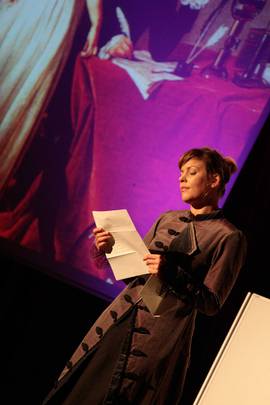Science on Stage at TU Berlin - Dramatic Reading Performance -
Friday, December 9th 2011, 5pm - 6.30pm; in German language.
Audimax of TU Berlin, Straße des 17. Juni 135, 10623 Berlin Registration

Financial support of BASF is gratefully acknowledged.
What is discovery? Why is it important to be first? These questions trouble the Characters in Oxygen. The action alternates between 1777 and 2001, the Centenary of the Nobel Prize, when the Nobel Foundation decides to inagurate a "retro-Nobel" Award for the prize in 1901. The Foundation thinks this will be easy. In the good old days, wasn't science done for science's sake? Wasn't discovery simple, pure and unalloyed by controversy, priority claims and hype?
The Nobel Committee decides to reward the discovery of oxygen, since that launched the Chemical Revolution. Lavoisier is a natural choice. But But what about scheele? What about Priestley? Didn't they discover oxygen? The play brings the candidates and their wifes to 1777 Stockholm at the invitation of King Gustav III. Through the scientists' wifes, in a sauna and elsewhere, we learn of their lives and those of their husbands. Meanwhile in 2001, the Nobel Committee argues about the conflicting claims of the three men.
The ethical issues around priority and discovery at the heart of this play are as timely today as they were in 1777. As are the ironies of revolutions. Lavoisier, the chemical revolutionary, is a political conservative, who give loses his life in the Jacobin terror. Priestley, the political radical, is a chemical conservative. And Scheele just wants to run his pharmacy. He, the first man on earth to make oxygen, got least credit for it. Will that situation be repaired 230 years after his discovery?









